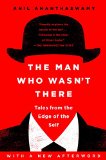Summary | Excerpt | Reviews | Beyond the Book | Readalikes | Genres & Themes | Author Bio
Investigations into the Strange New Science of the Self

Critics' Opinion:
Readers' Opinion:
First Published:
Aug 2015, 320 pages
Paperback:
Aug 2016, 320 pages
 Book Reviewed by:
Book Reviewed by:
James Broderick
Buy This Book
Mitra's team scanned her and the MRI scan revealed that the frontotemporal brain regions had atrophied. They noted, in particular, that a deep-brain region called the insula was heavily damaged in both hemispheres. There's growing evidence that the insula is responsible for the subjective perception of our body states, a crucial aspect of our conscious experience of selfhood. So, a damaged insula was likely hampering the woman's sense of her own body, and her dementia made it difficult for her to correct false perceptions, leading to claims of being dead.
The doctors started her on mild doses of antipsychotic and antidepressant medications. She recovered enough to take part in psychotherapy, with the therapist using her MRI scans as "evidence against her belief that her head was rotten," Mitra said. The therapist was able to shake her out of her false beliefs. She was eventually discharged, and continues to get better on her medication.
Graham, too, eventually recovered. Cotard's syndrome is, thankfully, transient in most people, even though the treatment at times might involve electroconvulsive therapy.
"I think Cotard's delusion is a victory of metaphor over simile," Zeman told me. "There are mornings when most of us get up and feel as if we are half-dead. So alterations of your experience which you might express using that kind of simile are not so uncommon. But the bizarre thing about Cotard's is that people begin to treat this simile as if it were literally true. And for that to happen, there surely has to be some disturbance of reason."
The paucity of patients with Cotard's syndrome means that the neural underpinnings of their delusions are yet to be fully understood, but it's clear that Cotard's syndrome is giving us a glimpse into the nature of the self.
Take, for instance, something philosopher Shaun Gallagher calls the immunity principle, an idea that goes back to Austrian philosopher Ludwig Wittgenstein. It refers to the fact that when we make a statement like "I think the Earth is flat," we can be wrong about Earth's flatness, but we cannot be wrong about the "I," the subjective self that is making the assertion. When we use the pronoun "I," the word refers to the one who is the subject of an experience, not someone else. I cannot be wrong about that. Or can I?
Cotard's delusion certainly gets philosophers thinking (if they need any further enticement), as do various other conditions, such as schizophrenia. In Cotard's delusion, the firm belief that "I don't exist" seemingly challenges the immunity principle. But even though the delusional person is wrong about the nature of his existence (which is analogous to Earth's flatness), the immunity principle holds because there is still an "I" making the claim, and that "I" cannot refer to anyone else but the person experiencing nonexistence.
What or who is that "I"? The question permeates this book. Whoever or whatever the "I," it manifests itself as a subject of experiences.
But how does the brain, with its physical, material processes, give rise to a seemingly immaterial, private mental life (at the core of which seems to be the "I," the subjectivity)? This is the so-called hard problem of consciousness. Neuroscience doesn't have an answer so far. Philosophers disagree vehemently on whether science can ever solve this problem, or whether this problem is illusory, one that might disappear as we understand the brain in more and more detail. This book does not offer neuroscientific solutions to the hard problem of consciousness—there are none, yet.
But this book does address the nature of the self. One way to think of the self is to consider its many facets. We are not just one thing to others or even to ourselves; we present many faces. The great American psychologist William James identified at least three such facets: the material self, which includes everything I consider as me or mine; the social self, which depends on my interactions with others ("a man has as many social selves as there are individuals who recognize him and carry an image of him in their mind"); and the spiritual self ("a man's inner or subjective being, his psychic faculties or dispositions").
Excerpted from The Man Who Wasn't There by Anil Ananthaswamy. Copyright © 2015 by Anil Ananthaswamy. Excerpted by permission of Dutton. All rights reserved. No part of this excerpt may be reproduced or reprinted without permission in writing from the publisher.





The Funeral Cryer by Wenyan Lu
Debut novelist Wenyan Lu brings us this witty yet profound story about one woman's midlife reawakening in contemporary rural China.
Your guide toexceptional books
BookBrowse seeks out and recommends the best in contemporary fiction and nonfiction—books that not only engage and entertain but also deepen our understanding of ourselves and the world around us.